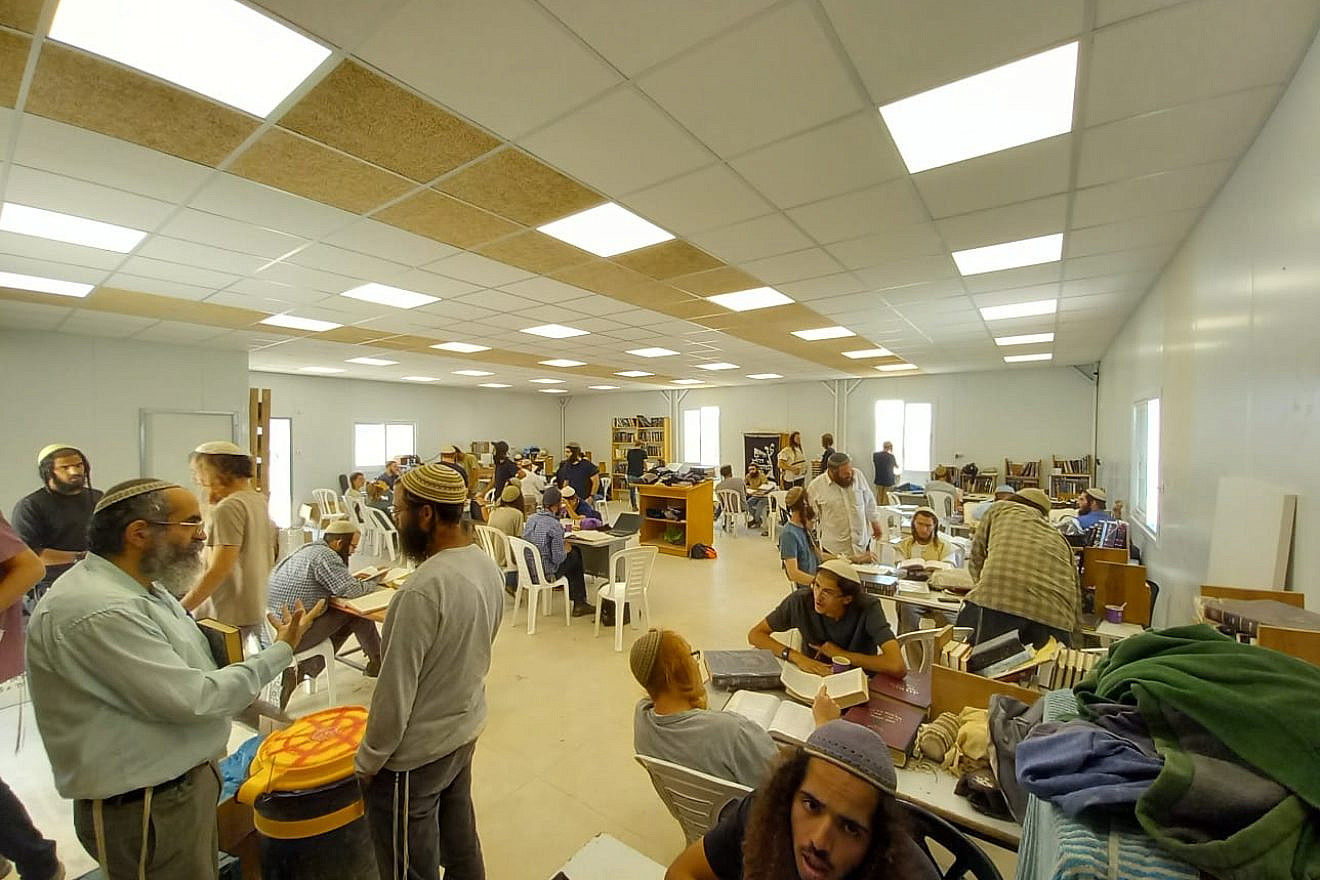In March, the Knesset voted 31-18 to repeal parts of the 2005 Disengagement Law and allow Israelis to return to the destroyed northern Samaria communities of Homesh, Sa-Nur, Ganim and Kadim.
In May, another step towards the return of Jewish life to the area was taken when Maj. Gen. Yehuda Fuchs, head of the IDF Central Command, signed an order allowing Israelis to reenter Homesh under a directive from Defense Minister Yoav Gallant.
Practically speaking, the only permanent structure currently in Homesh is the Homesh Yeshivah. The institution was established in 2006 by former Homesh residents and others from Jewish communities in the area, looking to undo what they felt was an unjust government decision taken the previous year.
Until the recent directives were applied, a game of cat and mouse took place between the yeshivah and the government, with the IDF—at the orders of the Defense Ministry’s Civil Administration—sent to the site countless times to destroy the makeshift structures serving as the yeshivah’s study hall and living quarters.

The nation of Israel wants us here
But Shmuel Wende, executive director of the Homesh Yeshivah for the past three-and-a-half years, told JNS that he is confident those days are over. Even as the bureaucratic approvals to fully legalize the yeshivah haven’t been signed, he believes the institution, located completely on state land and in a permanent structure, is here to stay.
More important, said Wende, himself a former student at the yeshivah, “The State of Israel acts according to the will of its citizens, and the nation of Israel wants us here. The nation knows the truth, even though it took a long time, that we belong here.”
Between 40 and 50 young men are studying high-level Gemara (Talmud) and Halacha (Jewish law) at the yeshiva, he said. Those who are married commute to Homesh each day, while those who are single sleep onsite.
In addition to the struggles the yeshiva has faced over its legitimacy with Israel’s government, it faces violence from some of its neighbors on a regular basis.
“The Arabs throw rocks and firebombs at our students as they commute, and just last week they detonated two bombs, which thank God turned out to be fake. But that could have been very dangerous,” Wende said.
In December 2021, Homesh Yeshivah student Yehuda Dimentman, a married father of a young child, was shot dead by terrorists at the entrance to Homesh. Two other students were wounded in the attack. Four Arab suspects were arrested for their involvement in the shooting.
Wende said the response of the Israeli government at the time, and that of then-Defense Minister Benny Gantz in particular, was to suggest that the yeshivah be taken down once and for all. However, days after Dimentman’s murder, 15,000 Israelis participated in an organized march in the pouring rain from the nearby community of Shavei Shomron to Homesh in support of the yeshivah.
“A message was sent that day, that it’s not just 50 yeshivah students learning here, rather thousands support our presence here,” said Wende. “Our response [to the attack] is to stay and learn here, comfortably. This is our land, and we must remain here.”
 Samaria Regional Council Chairman Yossi Dagan (left) and Homesh Yeshivah Executive Director Shmuel Wende have a chat. Courtesy of the Homesh Yeshivah.
Samaria Regional Council Chairman Yossi Dagan (left) and Homesh Yeshivah Executive Director Shmuel Wende have a chat. Courtesy of the Homesh Yeshivah.
A Jew is never alone
Rabbi Menachem Ben Shachar, a rabbi at the yeshivah for the past three years, told JNS that he became very emotional when the government revoked parts of the disengagement law and paved the way for the return to the area, as his sister is a former Homesh resident.
However, he would like the government to go all the way and fully legalize the yeshivah, community and more.
“We moved into our new permanent structure but had to do so in the middle of the night so as not to make a fuss. We are calling on the government to make this area 100% official, to pave roads, and go back to the way it was before the expulsion [disengagement],” he said.
Ben Shachar said he knows that some of Israel’s friends including the United States and the European Union are against the building of communities in Judea and Samaria, but “we expect the other nations to accept Israel’s decision to return here. The expulsion was a prize [given] to the terrorists, to Hamas, but establishing our permanence here is a sign of repentance by the nation of Israel after what happened,” he said.
Ben Shachar is hopeful that in addition to Homesh being rebuilt, Israel will one day rebuild the other three northern Samaria communities along with the Jewish communities of Gush Katif in the Gaza Strip, also abandoned in 2005.
As for the yeshivah, Ben Shachar takes pride in the level of Torah study taking place there.
“Our students are learning Gemara at a high level. There is some serious studying take place here, this isn’t summer camp,” he said with a laugh.
Ben Shachar and Wende both said that despite being surrounded by hostile neighbors, they are not afraid of being in Homesh or commuting to the yeshivah.
“I’m often asked, when I drive here alone, if I’m afraid,” Ben Shachar said. “Of course not. A Jew is never alone. After 2,000 years we are finally back at home.
“If the Jewish nation does what it should do, build in the Land of Israel, learn Torah, things will be good. We must proceed with confidence and not stammer, even it doesn’t please the other nations of the world.”


























